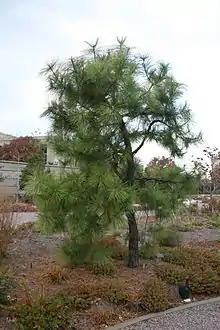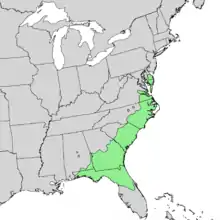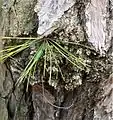Pinus serotina
Pinus serotina, the pond pine, marsh pine or pocosin pine, is a pine tree found along the Southeastern portion of the Atlantic coastal plain of the United States, from southern New Jersey south to Florida and west to southern Alabama. This pine often has a crooked growth pattern and an irregular top and grows up to 21 metres (69 ft) high,[1] rarely to 29 metres (95 ft).[2]
| Pond pine | |
|---|---|
 | |
| Scientific classification | |
| Kingdom: | Plantae |
| Clade: | Tracheophytes |
| Division: | Pinophyta |
| Class: | Pinopsida |
| Order: | Pinales |
| Family: | Pinaceae |
| Genus: | Pinus |
| Subgenus: | P. subg. Pinus |
| Section: | P. sect. Trifoliae |
| Subsection: | P. subsect. Australes |
| Species: | P. serotina |
| Binomial name | |
| Pinus serotina | |
 | |
| Natural range | |
The needles are in bundles of three or four, and 15–20 cm (6–8 in) long. The almost round cones are 5–8 cm (2–3 1⁄4 in) long with small prickles on the scales. Its cones are usually serotinous, requiring fire to open.[1] The pond pine is found in wet habitats near ponds, bays, swamps, and pocosins.[3] Often found among long leaf pines due to their high flammability and the pond pines need for fire to germinate.[4]
The species name serotina is derived from the persistently unopened cones that may remain closed for several years before they release their seeds; the opening is often in response to forest fires.
At the north end of its range, it intergrades and hybridises with pitch pine (P. rigida); it is distinguished from that species by the longer needles and on average slightly larger cones. Some botanists treat pond pine as a subspecies of pitch pine.
 Pond pine cones are smaller and rounder than loblolly pine cones.
Pond pine cones are smaller and rounder than loblolly pine cones. Unlike loblolly pines, pond pines have the ability to grow needles directly from the trunk.[5]
Unlike loblolly pines, pond pines have the ability to grow needles directly from the trunk.[5]
References
- Kral, Robert (1993). "Pinus serotina". In Flora of North America Editorial Committee (ed.). Flora of North America North of Mexico (FNA). 2. New York and Oxford – via eFloras.org, Missouri Botanical Garden, St. Louis, MO & Harvard University Herbaria, Cambridge, MA.
- Bramlett, David L. (1990). "Pinus serotina". In Burns, Russell M.; Honkala, Barbara H. (eds.). Conifers. Silvics of North America. Washington, D.C.: United States Forest Service (USFS), United States Department of Agriculture (USDA). 1 – via Southern Research Station (www.srs.fs.fed.us).
- Moore, Gerry; Kershner, Bruce; Tufts, Craig; Mathews, Daniel; Nelson, Gil; Spellenberg, Richard; Thieret, John W.; Purinton, Terry; Block, Andrew (2008). National Wildlife Federation Field Guide to Trees of North America. New York: Sterling. p. 73. ISBN 1-4027-3875-7.
- "Pinus serotina". www.fs.fed.us. Retrieved 2020-10-07.
- Trees, Shrubs, and Woody Vines of North Carolina: Pond Pine (Pinus serotina)
- Conifer Specialist Group (1998). "Pinus serotina". IUCN Red List of Threatened Species. 1998. Retrieved 12 May 2006.CS1 maint: ref=harv (link)
| Wikimedia Commons has media related to Pinus serotina. |
